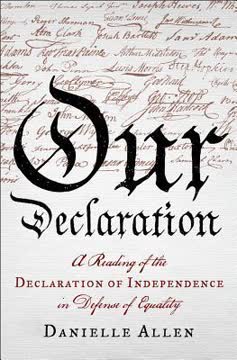Key Takeaways
1. Equality as Freedom from Domination
If we abandon equality, we lose the single bond that makes us a community, that makes us a people with the capacity to be free collectively and individually in the first place.
Foundation of Community. The Declaration posits that equality is not merely a desirable ideal but the very foundation upon which a free and cohesive community is built. Without a commitment to equality, the bonds that unite individuals into a collective capable of protecting its members from domination dissolve. This principle underscores the interconnectedness of individual liberty and collective strength.
Separate and Equal. The concept of equality in the Declaration begins with the idea of states being "separate and equal" among the powers of the earth. This initial framing emphasizes the importance of sovereignty and freedom from external control. Just as individual citizens should be free from domination, so too should nations.
Beyond Formal Rights. The book challenges the notion that equality is solely about formal civic rights, such as the right to vote. While these rights are essential, the Declaration's vision of equality extends far beyond them, encompassing a broader commitment to ensuring that all members of society have the opportunity to participate fully in the political and social life of their community.
2. Government as a Tool for Equality
The purpose of democracy is to empower individual citizens and give them sufficient control over their lives to protect themselves from domination.
Instrument for Empowerment. The Declaration views government not as an end in itself but as a tool to empower citizens and safeguard them from domination. This perspective highlights the importance of ensuring that government serves the interests of all its people, not just a privileged few. It also emphasizes the need for citizens to actively participate in shaping the policies and decisions that affect their lives.
Consent of the Governed. The Declaration asserts that governments derive their just powers from the consent of the governed. This principle underscores the importance of popular sovereignty and the right of citizens to hold their leaders accountable. It also implies that governments must be responsive to the needs and concerns of the people they serve.
Equal Access. The book emphasizes the importance of equal access to the instrument of government. This means that all citizens, regardless of their background or status, should have the opportunity to participate in the political process and influence the decisions that shape their lives. This includes not only the right to vote but also the right to hold office, to speak freely, and to organize and advocate for their interests.
3. Collective Intelligence through Egalitarianism
The purpose of democracy is to empower individual citizens and give them sufficient control over their lives to protect themselves from domination.
Wisdom of the Crowd. The Declaration suggests that the best way to understand the course of human events is to draw on the collective intelligence of the community. This means creating spaces for open dialogue and deliberation, where all voices can be heard and all perspectives can be considered. It also means valuing the contributions of ordinary citizens, not just experts or elites.
Potluck Approach. The book uses the metaphor of a potluck to illustrate how collective intelligence works. Just as each person brings a dish to share, so too does each citizen bring a unique perspective and set of experiences to the table. By combining these diverse contributions, the community can create a more complete and nuanced understanding of the challenges it faces.
Beyond Expertise. The book argues that expertise is not enough to solve complex problems. While experts have valuable knowledge and skills, they often lack the context and perspective that come from lived experience. To make good decisions, communities need to draw on both expert knowledge and the wisdom of ordinary citizens.
4. Reciprocity: The Bedrock of Freedom
In their ideal form, democracies empower each and all such that none can dominate any of the others, nor any one group, another group of citizens.
Mutual Responsiveness. The Declaration emphasizes the importance of reciprocity, or mutual responsiveness, in building a just and equitable society. This means that citizens should be willing to listen to each other's concerns and to respond to them in a fair and reasonable manner. It also means that leaders should be accountable to the people they serve and responsive to their needs.
Equality of Agency. The book argues that reciprocity is essential for achieving equality of agency, which means that all members of society have the power to shape their own lives and to participate fully in the decisions that affect them. When people are treated with respect and their voices are heard, they are more likely to feel empowered and engaged.
Beyond Tolerance. The book challenges the notion that tolerance is enough to create a just society. While tolerance is important, it is not sufficient. To truly build a community where all members can thrive, we need to move beyond tolerance and embrace a spirit of reciprocity, where we actively seek to understand and respond to the needs of others.
5. Co-Creation: Shared Ownership of Our World
Political equality is equal political empowerment.
Active Participation. The Declaration envisions a society where all citizens are co-creators of their shared world. This means that they are not merely passive recipients of government services but active participants in shaping the policies and decisions that affect their lives. It also means that they feel a sense of ownership and responsibility for the well-being of their community.
Beyond Individualism. The book challenges the notion that freedom is solely about individual autonomy and self-reliance. While individual liberty is important, the Declaration suggests that true freedom can only be achieved through collective action and shared responsibility. When citizens work together to create a better world, they are not only improving their own lives but also strengthening the bonds that unite them as a community.
Stake in the Future. The book emphasizes the importance of cultivating a sense of shared ownership in public life. This means ensuring that all citizens, especially young people, feel that they have a stake in the future of their community and that their voices matter. It also means creating opportunities for them to participate in the decisions that shape their world.
6. The Art of Democratic Writing
Language is one of the most potent resources each of us has for achieving our own political empowerment.
Language as Empowerment. The Declaration underscores the power of language as a tool for political empowerment. The ability to articulate one's ideas, to persuade others, and to participate in public discourse is essential for achieving political equality. This highlights the importance of cultivating citizens' capacity to use language effectively.
Group Writing. The book emphasizes that the Declaration was not the work of a single author but a product of group writing. This process, while challenging, is essential for democracies, as it requires individuals to come together, negotiate their differences, and forge a shared vision for their community.
Democratic Process. The book highlights the importance of the democratic process itself, not just the final product. The conversations, debates, and compromises that led to the Declaration were just as important as the document itself, as they helped to build a sense of shared purpose and commitment among the colonists.
7. The Power of Words and the Limits of Words
The men who wrote the Declaration of Independence grasped the power of words.
Words as Action. The Declaration demonstrates the power of words to shape reality. By declaring their independence, the colonists transformed themselves from subjects of the British crown into citizens of a new nation. This underscores the importance of taking words seriously and recognizing their potential to create change.
Beyond Rhetoric. The book cautions against viewing the Declaration solely as a rhetorical masterpiece. While the text is undoubtedly eloquent, its true power lies in its ability to inspire action and to mobilize people around a shared vision.
The Need for Action. The book acknowledges that words alone are not enough to achieve lasting change. The Declaration's ideals of equality and freedom must be translated into concrete actions and policies. This requires a sustained commitment to social and political reform.
8. The Declaration as a Model for Political Judgment
The Declaration also conveys another lesson of paramount importance.
Connecting Principles and Facts. The Declaration provides a model for how to make sound political judgments. It begins by laying out a set of principles, such as the rights to life, liberty, and the pursuit of happiness. It then presents a series of facts, detailing the grievances against King George III. Finally, it connects these principles and facts to a course of action: declaring independence.
The Importance of Evidence. The book emphasizes the importance of grounding political judgments in evidence. The Declaration does not simply assert that King George III is a tyrant; it provides a detailed list of his actions to support this claim. This underscores the need for citizens to be informed and to critically evaluate the evidence before forming their own opinions.
The Role of Moral Sense. The book argues that political judgment also requires a moral sense, a capacity to connect facts with principles and to make ethical evaluations. The Declaration appeals to the "candid world" to judge whether its actions are just, implying that all people have the capacity to make such judgments.
9. The Enduring Relevance of the Declaration
Equality and liberty—these are the summits of human empowerment; they are the twinned foundations of democracy.
Timeless Ideals. The Declaration's ideals of equality and freedom remain relevant today. While the specific challenges facing society may have changed, the fundamental principles of democracy continue to provide a framework for addressing them.
A Call to Action. The Declaration is not simply a historical document; it is a call to action. It challenges each generation to live up to its ideals and to create a more just and equitable society. This requires a sustained commitment to civic engagement and a willingness to challenge injustice wherever it is found.
A Living Document. The book suggests that the Declaration should be viewed as a living document, one that is constantly being reinterpreted and reapplied to new circumstances. This means that we must continue to grapple with its complexities and contradictions, and to strive to make its ideals a reality for all.
Last updated:
FAQ
What is Our Declaration: A Reading of the Declaration of Independence in Defense of Equality by Danielle S. Allen about?
- Focus on equality and freedom: The book offers a close reading of the Declaration of Independence, arguing that equality is the foundation of freedom and democracy.
- Philosophical and practical analysis: Allen unpacks the Declaration sentence by sentence, revealing its philosophical depth and practical implications for political life.
- Democratic writing and empowerment: The book highlights the Declaration as a product of collective, democratic writing and shows how language empowers citizens.
- Personal and political transformation: Through teaching and analysis, Allen demonstrates how engaging with the Declaration can awaken political consciousness and a sense of shared ownership.
Why should I read Our Declaration by Danielle S. Allen?
- Reclaims equality’s importance: The book challenges the modern neglect of equality, arguing it is as vital as liberty for democracy’s survival.
- Deepens understanding of a foundational text: Allen’s slow, careful reading reveals philosophical and political insights often missed in casual readings.
- Empowers citizens: By unpacking the Declaration’s argument and writing process, the book equips readers to engage more thoughtfully in political life.
- Connects history to present: Allen links the Declaration’s ideals to ongoing struggles for equality and freedom, making it relevant for contemporary readers.
Who wrote the Declaration of Independence according to Our Declaration by Danielle S. Allen?
- Collective authorship: The Declaration was not solely Jefferson’s work but resulted from collaboration among the Committee of Five, the Continental Congress, and others.
- Democratic writing process: The text emerged through debate, editing, and consensus-building, illustrating the art of democratic writing.
- Jefferson as draftsman: Jefferson wrote the first draft, but it was heavily revised by Adams, Franklin, Congress, and others.
- Multiple layers of conversation: The creation involved formal and informal discussions, votes, and negotiations, emphasizing democratic deliberation.
What are the five facets of equality presented in Our Declaration by Danielle S. Allen?
- Freedom from domination: Equality means securing conditions free from domination by others, including rulers or other states.
- Equal access to government: All people must have equal access to government as a tool to secure their rights.
- Collective intelligence: Building a community’s shared understanding through the contributions of all members strengthens political judgment.
- Reciprocity and agency: Mutual responsiveness and conversational reciprocity maintain equal spheres of agency and secure freedom.
- Co-creation and co-ownership: Equal participation in creating and sustaining the political community is essential for mutual respect and accountability.
How does Danielle S. Allen in Our Declaration explain the relationship between equality and freedom?
- Equality as foundation: Allen argues that equality is not in tension with freedom but is its sole foundation; without equality, freedom cannot be securely achieved.
- Reciprocal responsiveness: Freedom grows from egalitarian commitments to mutual responsiveness, where individuals recalibrate relations to protect equal agency.
- Broad concept of political equality: Political equality includes access to government, collective knowledge, reciprocity, and shared ownership, not just formal rights.
- Freedom depends on equality: Only through equality can individuals and communities achieve meaningful and lasting freedom.
What is the significance of political equality in Our Declaration by Danielle S. Allen?
- Bedrock of freedom: Political equality enables citizens to protect themselves from domination and participate equally in shaping their community.
- Empowerment and co-creation: It is about the opportunity for all citizens to co-create their political world, maximizing individual and collective flourishing.
- Status and capacity: The Declaration’s claim to equality means equal status as political powers capable of self-organization, not just equality in wealth.
- Fragility and neglect: Allen warns that equality has become the "more frail twin" of liberty, urging renewed attention to its vital role in democracy.
How does Our Declaration by Danielle S. Allen describe the Declaration of Independence as a democratic memo?
- Organizational tool: The Declaration is characterized as a memo that announces a change and organizes collective action, similar to a modern interoffice memo but with profound consequences.
- Four key actions: It declares reasons, presents facts, declares independence, and makes pledges, collectively bringing a new political reality into existence.
- Language as action: The Declaration uses words to "do things," transforming colonies into independent states, much like how vows create new social statuses.
- Inclusive audience: It addresses a "candid world," inviting judgment from all humanity and reflecting a democratic spirit.
What is the structure and argument of the Declaration as explained in Our Declaration by Danielle S. Allen?
- Four-part structure: The Declaration includes declaring reasons for separation, presenting grievances, formally declaring independence, and pledging mutual support.
- Logical syllogism: It builds an argument: all people have rights; governments exist to secure those rights; when governments fail, people may alter or abolish them.
- Self-evident truths: The famous sentence "We hold these truths to be self-evident..." contains a complex argument about equality, rights, and government legitimacy.
- Invitation to judgment: The text assumes readers have the moral sense and capacity to judge facts and principles, reinforcing democratic reasoning.
How does Danielle S. Allen in Our Declaration interpret the list of grievances against King George III?
- Definition of tyranny: The grievances collectively define tyranny as undermining the common good, rule of law, sovereignty, justice, prosperity, and security.
- Dashboard for judgment: The list serves as a set of gauges for citizens to assess whether their government is moving toward good governance or tyranny.
- Collective knowledge: The grievances were compiled through extensive conversation and information sharing among colonists, exemplifying democratic knowledge production.
- Pattern recognition: Building collective intelligence allows communities to discern patterns and anticipate the future, essential for self-government.
What challenges and contradictions about equality does Our Declaration by Danielle S. Allen explore?
- Slavery and exclusion: The book confronts the contradiction that the Declaration’s authors wrote about equality while owning slaves and excluding Native Americans.
- Twisting of ideals: Allen traces how "separate and equal" was twisted into "separate but equal," enforcing inequality and domination.
- Self-interest and habit: The book discusses how self-interest and social conditioning often prevent people from living up to the Declaration’s ideals.
- Words vs. reality: Allen wrestles with the value of principles when they coexist with systemic injustice, concluding that ideals are a necessary starting point for change.
How does Our Declaration by Danielle S. Allen address the role of God and nature in the Declaration of Independence?
- Nature’s God as source: The Declaration invokes "the Laws of Nature and of Nature’s God" as the source of the colonists’ right to equal and separate status.
- Creator and rights: It states that all men are "endowed by their Creator with certain unalienable Rights," linking rights to a divine endowment, though the nature of God is left ambiguous.
- Inclusivity of belief: Allen explains that belief in God is not necessary to accept the Declaration’s argument; secular readers can ground rights in nature and mutual respect.
- Political and theological balance: The text balances religious language with democratic principles, inviting both theists and non-theists to a shared commitment to equality and rights.
What are the key takeaways and lessons from Our Declaration by Danielle S. Allen?
- Equality is essential: Democracy depends on political equality as much as liberty; without equality, freedom is fragile and incomplete.
- Democratic writing matters: The Declaration exemplifies democratic writing as a collective, deliberative process that creates shared political reality through language.
- Slow reading empowers: Careful, slow reading of foundational texts like the Declaration can awaken political consciousness and improve citizens’ capacity to engage in democracy.
- Language shapes politics: Words are powerful tools for political empowerment, and understanding their use is crucial for sustaining democratic communities.
- Historical complexity: The Declaration’s ideals coexist with historical contradictions, requiring ongoing reflection and struggle to realize its promises fully.
Review Summary
Our Declaration received mixed reviews, with praise for its close reading of the Declaration of Independence and exploration of equality as a foundational principle. Many appreciated Allen's accessible writing style and thought-provoking analysis. Critics found the book repetitive and overly detailed at times. Some disagreed with Allen's interpretations or felt she stretched meanings too far. Overall, readers valued the book's emphasis on the importance of understanding this crucial historical document and its relevance to modern democracy.
Similar Books
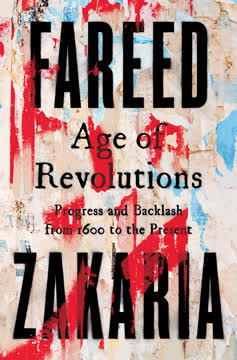
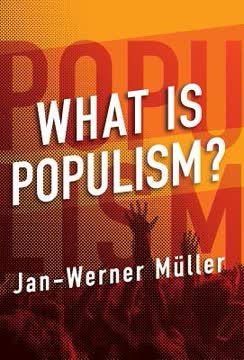
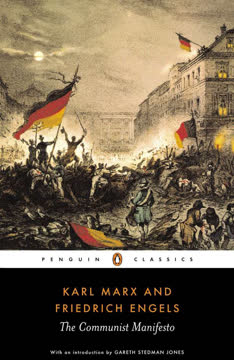
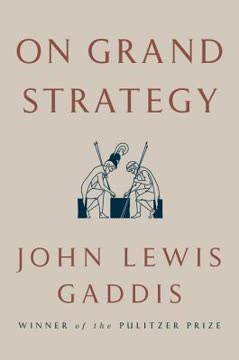
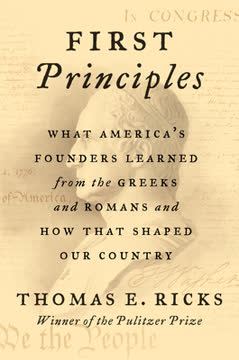
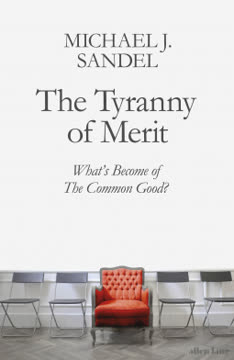
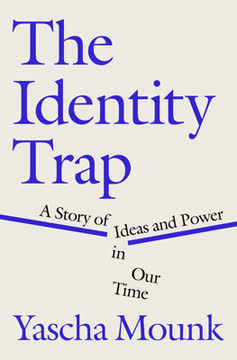
Download PDF
Download EPUB
.epub digital book format is ideal for reading ebooks on phones, tablets, and e-readers.
